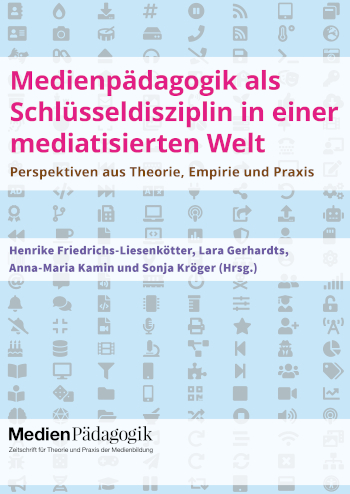Abstract
Mediated lifeworlds and a diversity of physical, geographical, technological, cultural, and social mobilities involve new challenges for education and learning in a digital age. In recent years, a variety of corresponding conceptualizations and methods has been developed in educational research and practice. One the one hand, we find technologically or culturally abridged concepts and reductionist approaches, more or less dealing with one category or dimension of the topic. On the other hand, there are ambitious approaches dealing with the enormous complexities of the issues concerned. The latter frequently refer to ecological or mobilities frameworks. Moreover, among the many ‹turns› that have been claimed after the linguistic turn, especially the ecological turn and the mobilities turn play an important role in the context of theorizing mobile learning and education. For one thing, a new mobilities paradigm has been proposed, then again various ecological approaches have been promoted, among them media ecology, information ecology, knowledge ecology, socio-cultural ecology, communicative ecology, political ecology, and ecologies of affect. In addition, there are different understandings of ecology, for example, as environment, social movement, moral norm, or network theory. The paper reflects on potentials and limitations of mobilities and ecologies as theoretical frameworks in the context of mobile learning.
References
Adolf, Marian. 2011. «Clarifying Mediatization: Sorting through a Current Debate». Empedocles: European Journal for the Philosophy of Communication 3 (2): 153–75. https://doi.org/10.1386/ejpc.3.2.153_1.
Aßmann, Sandra, Peter Moormann, Karina Nimmerfall, und Mirjam Thomann, Hrsg. 2017. Wenden. Wiesbaden: Springer Fachmedien Wiesbaden. https://doi.org/10.1007/978-3-658-14805-8.
Bachmair, Ben, Norbert Pachler, und John Cook. 2011. «Editorial. Mobile Learning Towards Curricular Validity in the Maelstrom of the Mobile Complex». MedienPädagogik: Zeitschrift für Theorie Und Praxis Der Medienbildung 19 (Mobile Learning), 1-6. https://doi.org/10.21240/mpaed/19/2011.07.09.X.
Berge, Zane L., und Lin Y. Muilenburg, Hrsg. 2013. Handbook of mobile learning. Florence, KY: Routledge.
Crompton, Helen. 2013. «A historical overview of mobile learning: Toward learner-centered education». In Handbook of mobile learning, herausgegeben von Zane L. Berge und Lin Y. Muilenburg, 3–14. Florence, KY: Routledge.
Fuster Morell, Mayo. 2011. «The Unethics of Sharing: Wikiwashing». 15. International Review of Information Ethics. http://www.i-r-i-e.net/inhalt/015/015-Morell.pdf.
Goor, Roel van, Frieda Heyting, und Gert-Jan Vreeke. 2004. «Beyond Foundations: Signs of a New Normativity in Philosophy of Education». Educational Theory 54 (2): 173–92. https://doi.org/10.1111/j.1741-5446.2004.00013.x.
Hörl, Erich, und James Burton, Hrsg. 2017. General ecology: the new ecological paradigm. Theory. London: Bloomsbury Academic, an imprint of Bloomsbury Publishing Plc.
Hug, Theo. 2015. «Microlearning and Mobile Learning». In Encyclopedia of Mobile Phone Behavior, herausgegeben von Zheng Yan, 1, 2 & 3:490–505. IGI Global. https://doi.org/10.4018/978-1-4666-8239-9.
Krippendorf, Klaus. 1994. «Der verschwundene Bote. Metaphern und Modelle der Kommunikation». In Die Wirklichkeit der Medien: eine Einführung in die Kommunikationswissenschaft, herausgegeben von Klaus Merten, Siegfried J. Schmidt, und Siegfried Weischenberg, 79–113. Opladen: Westdeutscher Verlag.
Luke, Timothy W. 1999. «Environmentality as Green Governmentality». In Discourses of the environment, herausgegeben von Éric Darier. Oxford, UK; Malden, Mass., USA: Blackwell.
Mansell, Robin. 2018. Transformative Communication Technologies: The Accountability Challenge. Kleine Medienreihe, 2/2018. Innsbruck: innsbruck university press. https://www.uibk.ac.at/iup/buch_pdfs/9783903187146.pdf.
Mausfeld, Rainer. 2018. Warum schweigen die Lämmer? Wie Elitendemokratie und Neoliberalismus unsere Gesellschaft und unsere Lebensgrundlagen zerstören. Frankfurt am Main: Westend Verlag.
Meister, Dorothee M., Theo Hug, und Norm Friesen, Hrsg. 2014. Educational Media Ecologies. Zürich: Zeitschrift MedienPädagogik 24. https://doi.org/10.21240/mpaed/24.X.
Pachler, Norbert, Ben Bachmair, John Cook, und Gunther R. Kress. 2010. Mobile learning: structures, agency, practices. New York: Springer.
Peters, Michael A., und Peter Roberts. 2012. The Virtues of Openness: Education, Science, and Scholarship in the Digital Age. Interventions: Education, Philosophy & Culture. Boulder, Colo.: Paradigm Publ.
Quinn, Clark. 2000. «mLearning. Mobile, Wireless, In-Your-Pocket Learning». Linezine, Nr. Fall 2000. http://www.linezine.com/2.1/features/cqmmwiyp.htm.
Rummler, Klaus. 2014. «Foundations of Socio-Cultural Ecology: Consequences for Media Education and Mobile Learning in Schools». MedienPädagogik: Zeitschrift für Theorie Und Praxis Der Medienbildung 24 (Educational Media Ecologies), 1-17. https://doi.org/10.21240/mpaed/24/2014.07.10.X.
Sharples, Mike, Josie Taylor, und Giasemi Vavoula. 2007. «A theory of learning for the mobile age». In The Sage Handbook of E-Learning Research, herausgegeben von Richard Andrews und Caroline Haythornthwaite, 221–47. London: Sage.
Sheller, Mimi. 2014. «The new mobilities paradigm for a live sociology». Current Sociology Review 62 (6): 789–811.
Sheller, Mimi. 2017. «From Spatial Turn to Mobilities Turn». Current Sociology 65 (4): 623–39. https://doi.org/10.1177/0011392117697463.
Sheller, Mimi, und John Urry. 2006. «The New Mobilities Paradigm». Environment and Planning A: Economy and Space 38 (2): 207–26. https://doi.org/10.1068/a37268.
Urry, John. 2000. Sociology beyond societies: mobilities for the twenty-first century. International library of sociology. London ; New York: Routledge.
Urry, John. 2012. «What is the mobility turn?» Mobile Lives Forum (blog). 2012. http://en.forumviesmobiles.org/video/2012/12/10/what-mobility-turn-467.
Vavoula, Giasemi, Norbert Pachler, und Agnes Kukulska-Hulme. 2009. Researching mobile learning: frameworks, tools, and research designs. Oxford; New York: Peter Lang.
Witt, Claudia de, und Christina Gloerfeld, Hrsg. 2018. Handbuch Mobile Learning. Wiesbaden: Springer Fachmedien Wiesbaden. https://doi.org/10.1007/978-3-658-19123-8.
Zuboff, Shoshana. 2019. The Age of Surveillance Capitalism: The Fight for a Human Future at the New Frontier of Power. London: Profile Books Ltd.

